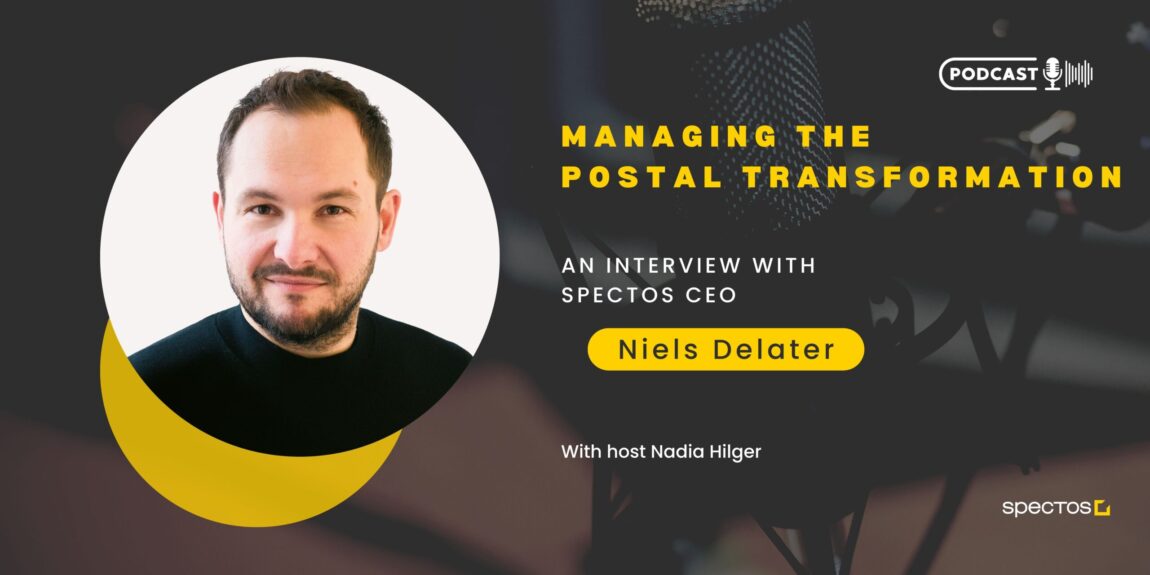Quality of Service Trends in the Postal Industry: Spectos CEO Niels Delater on the Impact of Reporting, Sustainability, and a Changing Workforce
The postal industry is undergoing a significant transformation, with customer demands and technological advancements continuously evolving. Spectos CEO Niels Delater, discusses the challenges and strategies for keeping up with these changes in an exclusive interview.
Want to enjoy a great conversation without the hassle of reading? Pour yourself a cup of coffee and tune in to our interview on Spotify.
You are currently viewing a placeholder content from Default. To access the actual content, click the button below. Please note that doing so will share data with third-party providers.
More InformationBefore we dive deep into our topic, let’s briefly talk about Spectos. In a nutshell – what does Spectos do?
Niels Delater: Spectos supports organizations and enterprises to improve their Service Quality through monitoring their performance and by providing them with solutions to increase efficiency and manage customer experience.
What’s the story behind Spectos? Why the focus on service quality?
Niels Delater: The story of Spectos begins in the days of the liberalization and privatization of the postal sector in Germany. From the early days of the privatization of the postal industry, we developed tools and solutions for postal operators. Privatization meant competition, and that was something rather unknown for the postal services in most countries. Suddenly, postal operators had to report their operational performance to regulators, customers and shareholders.
This was the origin of starting Spectos in 2001 – the peak years of the letter volumes in the postal industry. Since then, we have been supporting our clients around the world to manage the challenges of this ongoing transformation from an end-to-end perspective. In the end, the customers decide – and we believe that everybody likes great service, and we support our clients to deliver it.
In the course of the past year, what issues have you encountered in your work with postal companies around the globe, what problems are posts struggling with?
Niels Delater: Since 2001, the postal market has changed dramatically from a domestic letter mail-driven business to a diversified portfolio of services and solutions among all the different players in the market. Now we see operators that see their future in international cross-border e-commerce, those who focus on regional markets and last mile delivery for various products, those who redefine the universal service to serve the public at its best.
Beyond that, the larger customers of the postal services started to measure and control the performance from their end. That was and still remains a big challenge, especially when big customers, such as larger e-commerce companies, sometimes have better data and processes than the operators themselves – and are even starting to play a role in last mile delivery, the originally protected playground of the postal operators. That’s a big challenge, and from our point of view, great service and efficient processes are the best way to pick up on this.
What can we expect in the coming years, what trends do you see in the postal sector?

Niels Delater: Well, there are three areas where I anticipate new developments. These are management and reporting, changes in the workforce that require concerted digitization and automation efforts, and last but not the least sustainability. As change is happening very fast and the transformation accelerates with the decline of mail volumes, traditional products and services such as letter mail are impacted by an increased attention and awareness for service levels. Letter communication will become a premium product and customers want to know what they pay for.
Customers are used to continuous analytics as they experience it in the e-commerce and web world, seamless customer experience from marketing and sales, all the way down to operations and support. This requires real-time insights and real-time communication tools to manage this transformation from a customer’s perspective.
Rigid KPIs and large Excel sheets won’t do the job alone anymore. The agile approach, with flexible objectives and results, will help to manage this change – lots can be learned from the digital space here. Taking this on can help postal companies manage this change and stay competitive in the market. By being flexible and responsive to customer needs, they can better serve their customers’ expectations and ensure a high level of service.
Consumers are becoming more price-sensitive and expect top-notch service, while postal companies are facing declining volumes and rising wages. What does this mean for postal operations?
Niels Delater: One way to address this challenge is to look at ways to become more efficient and reduce costs. One option is to explore the use of technology and automation to streamline processes and reduce the need for labor. For example, using flexible automated sorting systems or implementing self-service kiosks for customers can help to reduce the workload for employees and improve efficiency.
Another option is to focus on providing added value to customers through premium services or specialized offerings. This could include things like expedited delivery or customized packaging options. By offering something extra that customers are willing to pay for, postal companies can potentially offset some of the pressure from declining volumes and rising wages.
Ultimately, it is necessary to find a balance between cost-cutting measures and offering premium services in order to remain competitive in a market where consumers are price-sensitive but also expect an excellent quality of service.
Another effect of decreasing business is the difficulty to downscale processes that were built for large and steadily increasing volumes. Heavy legacy systems create a large overhead, a necessarily decreasing workforce also means a brain drain for such legacy systems and processes. This is very hard to manage and requires processes to be more variable by further automating the operations, digitizing them and making them scalable in both directions. Another solution is to centralize certain services, pool or outsource them to specialists, who can handle such legacy systems.
Where do you see potential for optimization and efficiency gains for postal companies?
Niels Delater: One such example is the sorting process. Postal companies around the world have invested heavily in automated sorting equipment to increase capacity and handle the ever-increasing volume of parcels. These are difficult to predict on a day-to-day basis, and despite all the automation, you will always need people to handle a certain percentage of shipments that the sorting machines can’t handle because they fail due to the poor quality of the address labels. This may be because they are crumpled or handwritten, or simply because the information is incorrect. Our experience with postal companies has shown that this is the case for about 5 % of all consignments. With volumes of up to 1 million parcels per day at peak times, we are talking about 50,000 parcels per day.
Now, always having people available to manually sort these shipments is a difficult and costly endeavor, and it will always impact workflows because they will need to either be available on-site, regardless of the volume of shipments to be manually sorted, or they will need to be pulled from other tasks to do this manual address decoding. A really simple way to avoid this challenge and ensure efficient, flexible and stable operations is to outsource this process and have external staff digitize and correct the address information. Spectos has supported many postal companies with this digitization service for external video coding, helping them to ensure that they meet their delivery goals, while reducing costs at the same time.
Will it be enough for a company to invest in an electric fleet to be considered socially responsible?
Niels Delater: Corporate Social Responsibility has become a major differentiator to make a business future-proof. Those new sustainability requirements for postal operators hit at a time when investments are difficult to make. That’s why it is very important to know where to invest and what to do to improve the CSR activities and ranking to achieve the international objectives and meet those standards.

Investing in an electric fleet is certainly a step in the right direction when it comes to sustainability, as it can help to reduce greenhouse gas emissions and contribute to a cleaner environment. However, it’s important to recognize that sustainability goes beyond just the use of electric vehicles. It also involves things like reducing waste, conserving resources, avoiding traffic and unnecessary transport for minimizing the negative impact on the environment. Postal companies should consider a range of sustainability measures in order to be considered truly socially responsible. Beyond the measures and investments to take, the reporting, auditing and monitoring of those standards means high effort and can become a big threat, if done in the wrong way. Regulators, investors, banks, and large customers are requiring certificates to prove the CSR numbers and measures.
So in the end, it all comes down to data and how to use it for your purposes. How is Spectos positioned to serve these trends, such as agile reporting, digitization, and automation?
Niels Delater: Data is the reason why we are here. Data is our business: handling, creating and using it. On one hand, we use it to monitor the quality of service. On the other hand, we also help companies to improve with the data. That is why we’ve developed our Spectos Real-Time Performance Management™ platform, with which we offer a wide range of solutions to support the transformation of the postal industry.
Firstly, the core of the platform are monitoring services with a customer’s end-to-end perspective: measuring the right KPIs, delivering performance indicators that really matter and managing the full process. The platform allows incorporating ERP and CRM data, along with specific information from e.g. transit time monitoring systems or track and trace data for a comprehensive view on the service quality of the postal processes. Matching those numbers with the operational processes enables companies to see efficiency gaps, and that is what we provide with our platform.
Secondly, we offer various solutions to improve the customer experience, operational efficiency and quality management by digitizing processes that are often still handled manually or with Excel or Google Sheets. This makes everything more agile and easier to use. As for the next generation of workers, it makes it also a lot easier to handle and more fun to work with. In the end, it will also help to improve customer service. Everybody likes great service, and we are here to help to provide it. (Take a look at the Spectos approach to Service Quality Management)
Spectos delivers tailored solutions for postal companies. Follow the link below for more information or download the brochure for an in-depth look.






